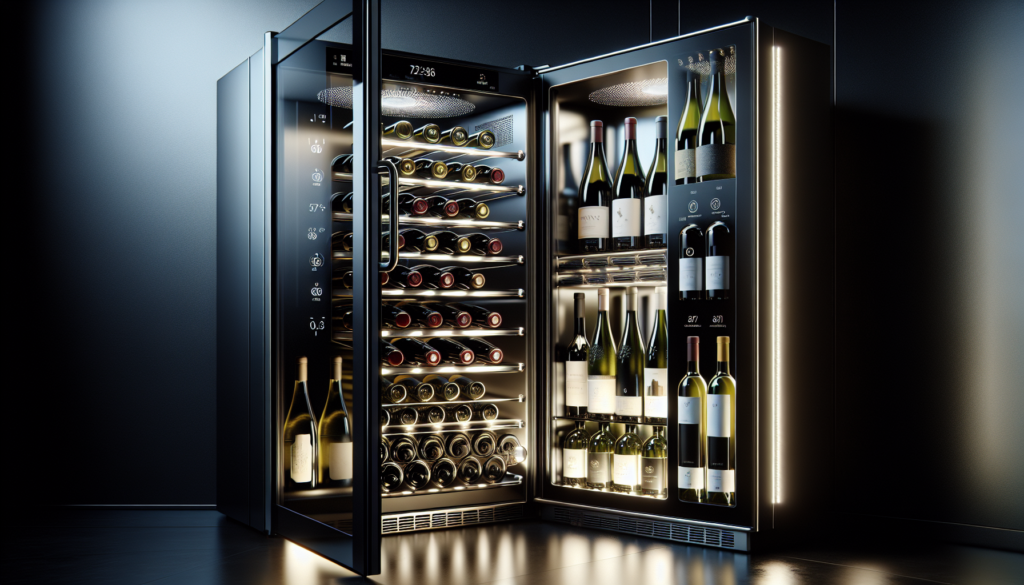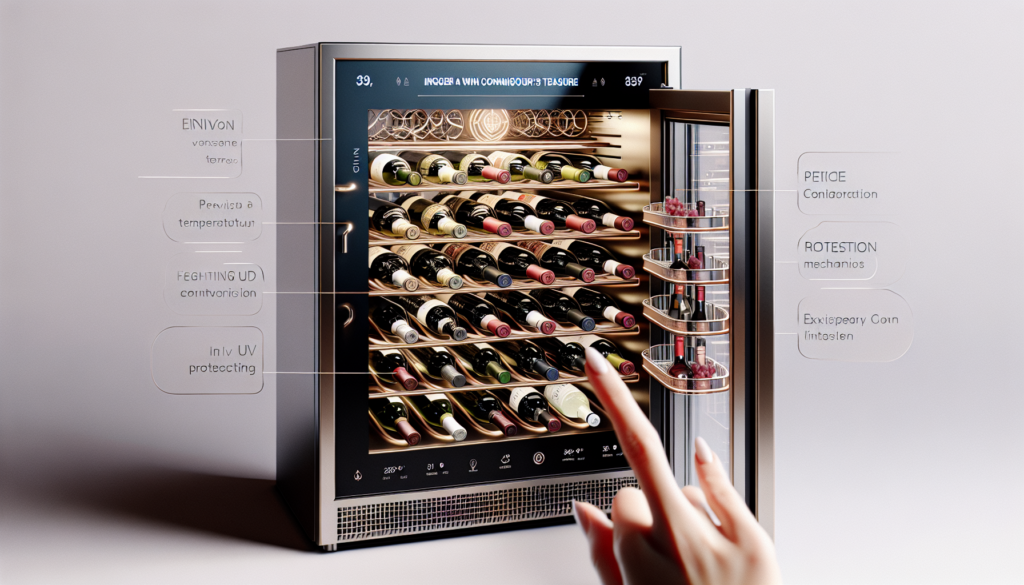Hey there! Have you ever wondered how long your beloved wine fridge is going to last? Well, in this article, we’re going to talk about the lifespan of wine fridges and provide you with all the essential details you need to know. Whether you’re a wine connoisseur or just someone who enjoys the occasional glass, understanding how long your wine fridge is expected to last can help you make informed decisions when it comes to investing in one. So, let’s uncork this topic and find out more about the lifespan of wine fridges!

Factors that affect the lifespan of a wine fridge
Quality of construction materials
The quality of the construction materials used in a wine fridge plays a significant role in determining its overall lifespan. Higher quality materials, such as stainless steel or tempered glass, are more durable and resistant to wear and tear. On the other hand, cheaper materials may deteriorate over time and lead to premature failure of the fridge.
Level of insulation
The level of insulation in a wine fridge is crucial for maintaining a consistent internal temperature. A well-insulated fridge will prevent the heat from seeping in and keep the cool air inside, ensuring the wine is stored at the optimal temperature. Insufficient insulation can cause the fridge to work harder, leading to increased energy consumption and potential damage to the compressor.
Temperature stability
Maintaining temperature stability is vital for preserving the quality and taste of your wine. Fluctuations in temperature can speed up the aging process and spoil the wine. A high-quality wine fridge will have precise temperature control mechanisms and efficient cooling systems to ensure that the desired temperature is maintained consistently.
Humidity control
Proper humidity levels are crucial for wine preservation. Too much humidity can lead to mold growth, while low humidity can dry out the corks and cause oxidation. Wine fridges with humidity control features help create the ideal environment for storing wine by maintaining optimal humidity levels.
Proper ventilation
Good ventilation is necessary to dissipate heat generated by the wine fridge’s compressor. Without proper ventilation, the unit may overheat, resulting in decreased efficiency and potentially damaging the electrical components. It is essential to ensure that the wine fridge has adequate airflow and is not placed in an enclosed space.
Frequency of use
The frequency at which you use your wine fridge can influence its lifespan. If you use it regularly, the fridge may experience more wear and tear, which can potentially lead to faster deterioration. However, regular use can also be beneficial as it helps maintain the proper functioning of the fridge by preventing mechanical issues that can arise from long periods of inactivity.
Maintenance and cleaning
Regular maintenance and cleaning are critical to prolonging the lifespan of your wine fridge. This includes cleaning the interior, removing any spills or stains, and keeping the exterior free from dust and debris. Additionally, checking and replacing the filters and ensuring the seals are intact will help maintain the efficiency of the fridge.
Power supply and electrical components
The power supply and electrical components of a wine fridge are essential for its proper functioning. Poor quality electrical components or voltage fluctuations can cause damage to the fridge’s internal mechanisms and shorten its lifespan. It is advisable to use a stable power supply and invest in a wine fridge with reliable electrical components for optimal performance and longevity.
Location and placement
The location and placement of your wine fridge can significantly impact its lifespan. Placing the fridge in an area prone to heat, direct sunlight, or extreme temperature fluctuations can put a strain on the cooling system and potentially cause damage. Optimal placement involves selecting a cool, well-ventilated area away from direct sunlight and other heat sources.
Overall build and design
The overall build and design of a wine fridge can affect its durability and longevity. A well-constructed and thoughtfully designed fridge will have sturdy shelves, reliable door seals, and easy-to-use controls. Attention to detail in the design ensures that the fridge can withstand the daily demands of wine storage and helps extend its lifespan.
Signs that your wine fridge may be reaching the end of its lifespan
Uneven cooling
If you notice certain areas of your wine fridge are not cooling evenly, it may be a sign that the fridge’s cooling system is failing. Uneven cooling can lead to temperature fluctuations, jeopardizing the storage conditions for your wine and potentially causing spoilage.
Excessive noise or vibration
Unusual levels of noise or vibration coming from your wine fridge can indicate a problem with the compressor or other mechanical components. These signs should not be ignored, as they may point to underlying issues that could lead to complete system failure if not addressed promptly.
Inconsistent temperature control
A wine fridge that struggles to maintain a consistent temperature is a cause for concern. If you find that the temperature inside the fridge fluctuates frequently or is consistently higher or lower than the set temperature, it may be an indication that the fridge’s cooling system is malfunctioning.
Condensation or moisture buildup
Excessive condensation or moisture inside your wine fridge is a sign that it is not maintaining the proper humidity levels. This can be detrimental to the quality of your wine and may indicate a problem with the fridge’s humidity control mechanisms.
Frequent breakdowns or malfunctions
Repeated breakdowns or malfunctions are clear indications that your wine fridge is nearing the end of its lifespan. If you find yourself calling for repairs or experiencing frequent system failures, it may be more cost-effective to consider replacing the unit rather than continuing to invest in repairs.
Expired warranty
An expired warranty can serve as a good indication that your wine fridge has reached the end of its expected lifespan. Once the warranty period ends, it becomes increasingly important to monitor the fridge for any signs of declining performance or potential failures.
Visible wear and tear
Obvious signs of wear and tear, such as rust, peeling paint, or damaged shelves, suggest that your wine fridge is aging and may not have much life left. These signs of deterioration can impact the fridge’s overall functionality and compromise the quality of the stored wine.
Decreased energy efficiency
If you notice a significant increase in your energy bills or find that your wine fridge is consuming more electricity than usual, this may indicate decreased energy efficiency. Aging components and wear and tear can cause the fridge to work harder, leading to higher energy consumption.
Lack of available replacement parts
As a wine fridge ages, it may become challenging to find replacement parts for repairs. If you encounter difficulties in sourcing replacement components, it may be a sign that your wine fridge has become obsolete and reaching the end of its lifespan.
Outdated technology
Advancements in technology have significantly improved the functionality and efficiency of modern wine fridges. If your wine fridge lacks features available in newer models, it may be an indication that it is outdated and nearing the end of its lifespan. Upgrading to a newer model could provide improved performance and a longer lifespan.
Average lifespan of different types of wine fridges
Built-in wine fridges
Built-in wine fridges, designed to be seamlessly integrated into kitchen cabinetry or other custom installations, typically have a lifespan of 10 to 15 years. The higher quality construction and insulation of these fridges contribute to their durability and longevity.
Freestanding wine fridges
Freestanding wine fridges, which can be placed anywhere and do not require installation, generally have a similar lifespan to built-in fridges, averaging between 10 to 15 years. However, it is important to note that the actual lifespan can vary depending on the quality of the unit and how well it is maintained.
Countertop wine fridges
Countertop wine fridges are smaller units designed to sit on kitchen countertops or other surfaces. These fridges tend to have a shorter lifespan compared to larger freestanding or built-in models, averaging around 5 to 10 years. Their compact size and potentially lower quality construction can contribute to a shorter lifespan.
Dual-zone wine fridges
Dual-zone wine fridges, which feature separate temperature zones for storing red and white wines, typically have a similar lifespan to built-in and freestanding models, ranging from 10 to 15 years. Their longevity is influenced by the same factors, such as construction quality and maintenance practices.
Thermoelectric wine fridges
Thermoelectric wine fridges, which use a cooling technology based on the Peltier effect, tend to have a shorter lifespan compared to compressor-based fridges. These fridges generally last between 7 to 10 years. However, they offer advantages such as quiet operation and vibration-free cooling.
Compressor-based wine fridges
Compressor-based wine fridges, which use a compressor and refrigerant to cool the internal space, typically have a longer lifespan compared to thermoelectric models. These fridges can last anywhere from 10 to 20 years, with proper maintenance and care.
Modular or stackable wine fridges
Modular or stackable wine fridges consist of individual units that can be combined to create a larger wine storage system. The lifespan of these fridges is similar to other types, averaging between 10 to 15 years. The longevity depends on the quality of the individual units and how well they are interconnected and maintained.
Custom wine cellars
Custom wine cellars, which are built specifically for wine storage and can be designed to fit any space, often have the longest lifespan among wine storage options. With proper construction, insulation, and climate control mechanisms, custom wine cellars can last for several decades.
Multifunction wine fridges
Multifunction wine fridges, which combine wine storage with other features such as a beverage cooler or a freezer compartment, tend to have a shorter lifespan compared to dedicated wine storage units. These fridges often have a lifespan similar to countertop models, ranging from 5 to 10 years.
Smart-enabled wine fridges
Smart-enabled wine fridges, equipped with advanced technology and connectivity features, have a similar lifespan to other types of wine fridges. The smart features add convenience and functionality but do not significantly impact the overall lifespan of the fridge.
Tips to extend the lifespan of your wine fridge
Choose a high-quality wine fridge
Investing in a high-quality wine fridge from the start is one of the best ways to ensure its longevity. Look for fridges made with durable materials and components that can withstand daily use and temperature fluctuations. Research reputable brands known for their reliable products.
Ensure proper installation and placement
Proper installation and placement of your wine fridge are crucial for its optimal performance and lifespan. Follow the manufacturer’s guidelines for installation and ensure that the fridge is placed in a cool, well-ventilated area away from direct sunlight and other heat sources.
Regularly clean and maintain your wine fridge
Regular cleaning and maintenance are essential for extending the lifespan of your wine fridge. Clean the interior regularly, wiping away any spills or stains. Keep the exterior dust-free and clean the condenser coils periodically. Check and replace filters as recommended to maintain efficiency.
Monitor and maintain the temperature and humidity levels
Regularly monitor the temperature and humidity levels inside the wine fridge to ensure they remain within the recommended range. Use a reliable thermometer and hygrometer to track these parameters. Make any necessary adjustments to the fridge’s settings to maintain the ideal storage conditions for your wine.
Avoid overloading your wine fridge
Overloading your wine fridge with too many bottles can strain the cooling system and lead to decreased efficiency. Follow the fridge’s capacity guidelines and avoid overcrowding the shelves. This allows for proper airflow and ensures that the fridge can maintain a consistent temperature.
Keep the wine fridge well-ventilated
Proper ventilation is vital for the optimal performance of your wine fridge. Ensure that there is sufficient space around the fridge for adequate airflow. Do not block the vents or obstruct the cooling system. Maintaining good ventilation helps prevent overheating and potential damage to the fridge.
Handle the wine bottles with care
When placing or removing wine bottles from the fridge, handle them with care to minimize the risk of damage to both the bottles and the fridge. Rough handling can cause vibration and potential damage to internal components. Additionally, ensure that the bottles are securely stored to avoid any accidental spills or leaks.
Upgrade or replace worn-out components
If you notice any signs of wear or components that are not functioning optimally, consider upgrading or replacing them. This may include worn-out seals, damaged shelves, or faulty temperature or humidity control mechanisms. Prompt replacement of these components can help maintain the overall performance and lifespan of the wine fridge.
Invest in a warranty or extended protection plan
To provide additional protection and peace of mind, consider investing in a warranty or extended protection plan for your wine fridge. This ensures that you are covered in case of any unexpected repairs or component failures. Read the terms and conditions carefully to understand the coverage and duration of the warranty.
Stay up to date with technology advancements
As technology progresses, new features and advancements may be introduced in the market. Keeping yourself informed about these advancements can help you make informed decisions when it’s time to replace your wine fridge. Upgrading to a more efficient and technologically advanced model can extend the lifespan of your wine storage solution.
By considering these factors, signs, average lifespans, and tips, you can ensure that your wine fridge lasts for many years, preserving your favorite wines and enhancing your overall wine storage experience. Remember to choose a high-quality fridge, maintain it properly, and stay updated with latest advancements. Cheers to long-lasting wine enjoyment!

